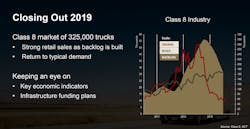More than 3,500 Mack Truck union employees went on strike Sunday morning, joining the more than 50,000 United Auto Workers employees at General Motors, who have been on strike for a month.
The UAW has six chapters at Mack plants in five cities. It said the strike is over wages, job security, schedules, overtime, skilled trades, workplace safety, seniority, benefits, health care, and temporary workers. Mack is part of the Volvo Group, which also produces Volvo Trucks in North America. At least one of the Mack plants builds engines and transmissions for both truck brands.
“We are surprised and disappointed that the UAW decided to strike, rather than to allow our employees to keep building trucks and engines while the parties continued to negotiate,” Mack Trucks President Martin Weissburg said in a statement issued over the weekend. “The positive working relationship between local UAW leadership and management at our facilities was clearly in evidence throughout the negotiations, and progress was being made.”
Weissburg noted that Mack assembles all of its trucks and engines for the North American market in the U.S., while some of its competitors build products in “lower-cost countries.” Navistar and Daimler, for example, build some Class 8 trucks in Mexico for the U.S. market but also have significant facilities in the U.S.
“UAW members get up every day and put in long, hard hours of work from designing to building Mack trucks,” said Ray Curry, secretary-treasurer of the UAW and director of its Heavy Truck Department. “UAW members carry on their shoulders the profits of Mack and they are simply asking for dignity, fair pay and job protections.”
The striking plants are in Allentown, Pa., Middletown Pa., Baltimore, Md., Jacksonville, Fla., and two in Hagerstown, Md. The UAW said it has “over 3,600 workers” in those locations, while Mack said it was “about 3,500.”
Mack officials say there are no plans to close any of its U.S. plants. “We’ve invested more than $400 million in our plants and logistics network over the last 10 years,” Weissburg said, “and since 2015 have insourced work that has created more than 500 jobs in our U.S. factories. We have significant new investments in both facilities and products on the way.”
UAW’s Curry said that while the union and its members stand strong on its issues, they are “confident that further discussion of these, and other open issues, will result in progress toward the goal of a contract that works for both the company and its UAW members.”
Weissburg said the OEM is also confident the negotiations will end with “an agreement that provides a competitive wage and benefit package for our employees and families, and helps to ensure the company’s competitiveness.”
Heavy-duty truck market
After a record-breaking 2018 for Class 8 trucks, the segment has seen a consistent waning in demand in 2019 as orders have outpaced production, leading to a backlog of trucks to be built since late last year. The backlog is about 130,000 trucks as of this fall — compared to the nearly 300,000 truck backlog a year ago this month.
“It has been an interesting year to say the least,” Jonathan Randall, Mack’s senior VP of North American sales and marketing, told the media during a press briefing at the American Truck Associations’ Management Conference & Exhibition in San Diego on Oct. 7. While the OEM’s executives made no mention of union contract negotiations, Randall discussed overall Class 8 economics.
“It’s been an interesting 18 months in the industry,” he continued. “And we can say that we’re seeing the cooling off — that is not a surprise — that we all expected. As you can see, the economy is normalizing from what you saw were some fairly significant numbers previously in growth — and not only in growth for GDP but also for our markets.”
He said manufacturing growth is starting to recover from a weak first half of 2019. Construction spending is stable, Randall added, as housing construction is also up. “Retail sales continue to drain the backlog we had built over the last 12, 16 months with trucks getting out there. There’s still a lot of inventory in the industry but the retails on a monthly basis was starting to burn through it when you look at North America at anywhere from 27,000 to 31,000 in monthly retails burning out of that backlog.”
“The Class 8 market this year is 325,000 trucks,” Randall said of the retail market for heavy duty trucks in North America. “When we started our journey earlier this year, we were thinking it was going to be about 300,000 or 310,000. And we’ve bumped it several times since… There’s nothing that shows us from a retail standpoint that we’re not going to hit that number.”
Randall said last week that Mack won’t release its 2020 Class 8 forecast until later this year but even before the strike the OEM expected a dropoff next year.
“Where we see opportunity in that is that we still view the construction segment, the refuse segment, the dirty truck segment being very strong next year,” he said. “And even as we drop (in) the market next year, it is still from a historical standpoint going to be a pretty good market overall. The majority of what we see dropping is going to be in the long-haul segment. So, actually the retail sales and the volume of segment is going to be made up by construction straight trucks, COEs, daycabs are going to take a larger portion of the overall market.
“This year, long haul accounts for about 48-49% of sales and retails. We’re thinking that is probably going to be closer to 43-44% next year. And those other segments are going to pick up that slack from just the percentage of the overall market, which is good for Mack because those are strong core segments for us. And we’ll still continue to compete with the Anthem in the over-the-road segment.”
Randall stressed that “normal does not equal bad.” He said to expect a Class 8 market in the mid-200,000 level as the industry works through the backlogs.
The striking UAW members want to reap some of the rewards of the busy truck market.
“The last four years we have helped Mack Truck make significant profit through our work,” said Doug Irvine, president of Local 2301 and president of the Mack Truck Council. “All we are asking is that the company treat us with the dignity and respect we deserve in making them successful.”





